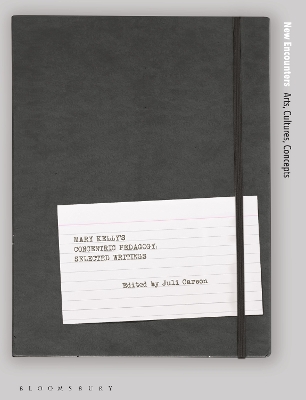New Encounters: Arts, Cultures, Concepts
1 total work
Selected and introduced by Juli Carson, this book presents a collection of essential essays, interviews, and never-before published archival materials that trace the development of the teaching of major artist and thinker Mary Kelly, from 1980-2017.
As an artist and a theorist, Kelly is known for her foundational contributions to Feminism and Conceptual Art; she is also revered for her innovative pedagogy, which has influenced countless artists, writers and teachers within the international art community. Her description of a feminist practice of concentric pedagogy, centred on the artwork rather the mastery of the teacher, radically changed teaching practice in art studios.
Detailing Kelly’s innovative pedagogical program, the essays are split into three sections: The Method, which focuses on Kelly’s renowned method of “ethical observation” within studio critique; The Project, which explores her notion of what constitutes an artistic project; and Project and Method in the Field which presents, for the first time, a transcription of On the Passage of a Few People though a Rather Brief Period of Time, a performative colloquy commissioned by the Tate Modern and moderated by Kelly in 2015; following this transcription is a portfolio of practicing artists previously enrolled in Kelly’s Interdisciplinary Studio Area at UCLA.
Mary Kelly’s Concentric Pedagogy highlights how contemporary studio teaching practice has been largely informed by Kelly’s bold and innovative approach to art pedagogy, evidencing how the intersection of teaching, artistic practice, and radical political engagement can transform our approach to all three.
As an artist and a theorist, Kelly is known for her foundational contributions to Feminism and Conceptual Art; she is also revered for her innovative pedagogy, which has influenced countless artists, writers and teachers within the international art community. Her description of a feminist practice of concentric pedagogy, centred on the artwork rather the mastery of the teacher, radically changed teaching practice in art studios.
Detailing Kelly’s innovative pedagogical program, the essays are split into three sections: The Method, which focuses on Kelly’s renowned method of “ethical observation” within studio critique; The Project, which explores her notion of what constitutes an artistic project; and Project and Method in the Field which presents, for the first time, a transcription of On the Passage of a Few People though a Rather Brief Period of Time, a performative colloquy commissioned by the Tate Modern and moderated by Kelly in 2015; following this transcription is a portfolio of practicing artists previously enrolled in Kelly’s Interdisciplinary Studio Area at UCLA.
Mary Kelly’s Concentric Pedagogy highlights how contemporary studio teaching practice has been largely informed by Kelly’s bold and innovative approach to art pedagogy, evidencing how the intersection of teaching, artistic practice, and radical political engagement can transform our approach to all three.
